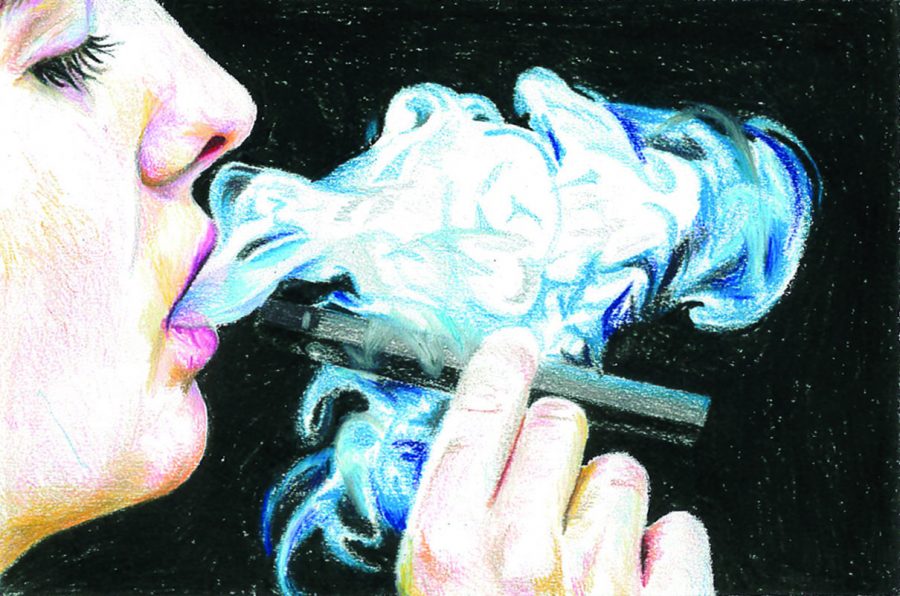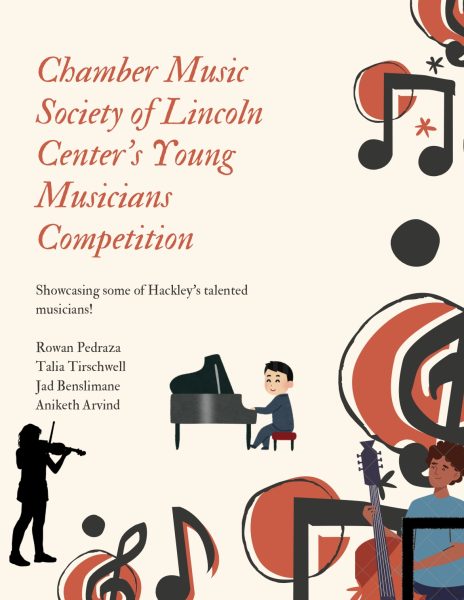Administrators and students wrestle with the recent Juul trend in the Upper School
Credit: Ariana Swei
May 21, 2018
“It calms you down or makes you think it does,” said an anonymous Hackley student on Juuling.
Juul, the most popular brand of e-cigarettes, launched in 2015 with a mission “to eliminate cigarettes by offering existing adult smokers with a true alternative to combustible cigarettes.” Although New York State law prohibits anyone under 18– under 21 in New York City– from purchasing e-cigarettes, devices like Juul continue to be widely-used at social gatherings and on school grounds.
There’s a secret cue for some students, a signal to congregate in the bathrooms to take a hit during class or their free periods. Students take hits to last them until their next free period or the next cue. For some, it’s an enjoyable habit, but for others Juuling has become a real problem, perpetuated by addiction or peer pressure.
Though this problem has only surfaced recently, the Dial spoke to several Hackley students, preferring to remain anonymous to avoid repercussion, who either admitted to trying Juul once or to using it on a regular basis.
Although the Dial was unable to obtain precise numbers regarding the extent of the problem, our research and interviews gave us the impression that a significant number of Hackley students have at least tried Juul.
An anonymous student cited stress from school work and college prep, as well as their anxiety as some of the main reasons for “juuling”. In addition to the relief, juuling “gives a short term buzz. It doesn’t have an effect that hangs around like cigarettes or marijuana. It passes quickly and allows you to continue with your day,” said the student.
Unlike cigarettes, Juul and other e-cigarettes don’t require combustion of chemicals or tobacco, which can lead to lung cancer. While the long-term effects of vaping e-liquids are still unknown, researchers worry more about user dependence on nicotine as each Juul pod contains as much nicotine as a pack of cigarettes. However, some studies have concluded that the vapors from e-cigarettes, but not specifically Juul, contain toxic substances such as lead and other metals. Clearly, more studies need to be conducted before there can be any certainty about the safety of Juul.
But regardless of whether it is true or not, many students believe juuling is safer than smoking: “A quick google search will tell you [Juuling is] nowhere near[ly] as harmful as smoking that involves actual combustion,” another anonymous student said. “Even though they haven’t been around long enough to do reliable studies on long-term effects, the general feeling kids have about them is pretty casual. Although personally I’ve never owned or spent money on one, if I’m out with friends I’d be much more comfortable with a Juul than cigarettes, which, maybe ironically, I abhor.”
Nonetheless, Juul pods’ high nicotine content calls for some health repercussions. According to Livescience, nicotine can potentially worsen heart diseases in persons with severe heart conditions. Studies have also shown that e-cigarette users have more respiratory problems, an issue one student already experienced.
“When I used to Juul every once in a while I never noticed any side effects,” said the student. “Then I started using it daily, and I noticed at practice that my lungs were getting tired more quickly and I ran out of breath quite easily.”
Despite the fact that juuling is quickly gaining popularity on the Hackley campus, Juul’s relatively recent release means some adults have not heard of this new phenomenon. Despite working closely with students as both a teacher and a dean, junior dean Melissa Stanek said she did not learn about Juul until last spring during the girls lacrosse trip.
“This is fairly new, and it’s definitely new for us. I remember my first awareness of this horrible phenomenon was last spring. I was on the lacrosse trip and I saw someone on the street vaping, so I started asking some of the girls,” said Ms. Stanek. “I was getting my information from them… I think for us it’s new but we’re very well aware on how pervasive it’s become.”
The device is compact and resembles a thumb-drive, making it easy for students to carry without adults recognizing or noticing it in a classroom setting. Ms. Stanek hopes to educate more students and adults about Juul- and vaping in general. According to her, a crucial step is to teach adults to recognize the device in the first place.
“Some of them look like iPods, some look like USBs, you can have them plugged them into your computer while you’re in class. So raising awareness amongst the adults is crucial so that they can communicate to the students their own concerns and recognize it when they see it,” said Ms. Stanek.
Some high schools are taking a more active approach to prevent juuling. According to Kate Zernicki’s article on The New York Times, some high schools are assigning teachers to regulate bathrooms, even going as far as closing all but two bathrooms at the school. New Trier High School in Winnetka, IL is looking to install vapor detectors in the bathrooms, which would alert authorities of any changes in the air quality.
Sophomore dean Chris Loomis doesn’t foresee these changes happening on campus, and sees the health concerns connected to vaping as more important than disciplinary consequences. “To be candid about it, the disciplinary response is less of a concern for us than the health and wellbeing of a student,” said Mr. Loomis. “This is a major health concern that’s on our radar. Busting the kids is never the object, it’s trying to make sure they’re making healthy decisions.”
Both deans emphasized that “in any situation involving drugs or alcohol-and in this case, these new things- if you have concern for yourself or for your friend, you can come to really anyone and express that concern and there will be no disciplinary consequences associated,” said Ms. Stanek.
Students who are caught juuling, or vaping, on campus may go before the Board of Magistrates, or simply the administration. According to the Upper School Handbook, “Students are prohibited from smoking or using smokeless tobacco on School grounds… including e-cigarettes.” While the consequences aren’t specified, repercussions in past cases have involved Saturday detentions and conducting personal research on vaping.
In terms of the health curriculum, teacher Cassandra Sekkas introduced a video aimed at educating students about the physical consequences of vaping. The video included information about common tobacco products including hookah and some misconceptions regarding e-cigarettes, but no information about Juul products. Sophomore student Taylor Robin does not believe the video was effective: “I think people are just going to continue doing what they do.”
In the future, Ms. Sekkas believes that the best way to educate students about vaping is peer-to-peer: “I believe we could use peer advisory as a place to have more discussions regarding this as well as community times and possibly advisory.” In addition, she believes that vaping education should begin in Middle School.






![Although the affect of COVID-19 has been on a decline with less cases and deaths allowing most of us to remain mask free, people on the Hilltop are still choosing to mask up. Personal health concerns as well as helping an elderly neighbor are reasons as to why middle school science teacher Emma Olsen still wears a mask years after the COVID-19 pandemic began. Since I am helping take care of him, you know I go over to work with his dogs, that kind of thing; I dont want to bring [the virus] home to him, Ms. Olsen said.](https://hsdial.org/wp-content/uploads/2024/03/IMG_1713-450x600.jpg)




